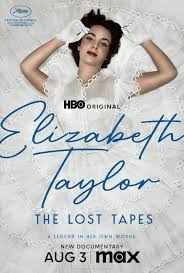
ELIZABETH TAYLOR, THE LOST TAPES
US, 2024, 100 minutes, Colour.
Directed by Nanette Burstein.
It is something of an understatement to say that Elizabeth Taylor was a significant world figure in her day. She spanned the decades, born in 1932, moving to the US at the breakout of World War II, beginning her film career in 1943 with Lassie, come home, consolidating it, Riding in the British races, National Velvet, a very strong career into the 1970s. He died in 2011.
The lost tapes of the title refer to interviews with Richard Meryman, 40 hours which took place in 1964, then placed in an attic and only discovered by the interviewer’s wife in 2019 and made available. Documentary director, Nanette Burstein, has organised a great variety of segments from the tapes to make Elizabeth Taylor’s narrative about her life and career up to this period, material and 1966, culminating in her appearance in Who’s Afraid of Virginia Woolf and her winning her second Oscar for that performance.
While the voice-over is significant, the director has been able to obtain a great range of visual footage of the actress, of her life in public, aspects of her life in private, interviews, social photos, and, clips from a great number of her films. This is always something which makes a favourable audience want even more.
There is great emphasis on how beautiful Elizabeth Taylor was as a little girl, as a teenager, as a young adult, but voicing dislike of her schooling at MGM studio – moving into adult roles, even as Robert Taylor is wife in The Conspirators, when she was 18. And, there is a lot of footage and her own observations about her first marriage to hotel heir, Nicky Hilton, the initial happiness, his character, her moving towards a divorce. Then, for the curious, there is her marriage to Michael Wilding, the British actor some decades her senior, some years of happiness, dependence on him, continuing her career but dissatisfied with the roles that MGM was giving her. And she had two sons. The tapes offer observations about Michael Wilding, the strains on their marriage, and her divorce when she was still in her mid-20s.
For those interested in her comments about her further marriages, needless to say, there is quite a great deal, especially about Mike Todd, enjoying his so-called lack of education, oddball style and humour, his achievements, and happiness with Elizabeth Taylor, the birth of their daughter, the tragedy of his accidental death in a plane crash.
For audiences wondering about Eddie Fisher (and not favourable to him), her comments about him as a friend of Mike Todd, Debbie Reynolds being her bridesmaid, the talking with Eddie Fisher, Mike Todd’s friend,, his infatuation with her, the rapidity of marrying Elizabeth Taylor only hours after the divorce from Debbie Reynolds – Elizabeth Taylor indicating the Debbie Reynolds that made to something of a show of her shock. Finally, Elizabeth Taylor says she was not in love with Fisher but he was a good friend, especially talking about Mike Todd.
There is Elizabeth Taylor’s illness, highlighting some of her roles, especially the support of George Stevens in both A Place in the Sun and Giant, many sequences, background, James Dean, and her friendship with gay actors, Rock Hudson, Montgomery Clift, a lifelong bond with Roddy McDowell who makes commentary throughout this film. There are scenes from Suddenly, Last Summer as well as her complete dislike of Butterfield 8 – and the scene of her accepting her Oscar for this performance.
Cleopatra. Richard Burton.
In fact, there is quite a lot of background about the making of Cleopatra, initially with Ruben Mamoulian and, then Joseph Mankewiecz, scenes with Rex Harrison, then the arrival of Richard Burton, her illness, delays with production, starting again with so many consequences in recasting, many scenes from the film itself, especially her entry into Rome with the cast of thousands.
Of course, audiences will be wanting to see the relationship with Richard Burton, here Elizabeth Taylor’s commentary on meeting him as a badly hangover drink, the bonding between them, the breakup of his marriage, many scenes of them together, in other films, socially, with their children bonding with Burton, and her saying that the marriage would last for 50 years.
And, then being hounded by the paparazzi, condemned, even with a glimpse of John XXIII in the Vatican, but some of the winning over public opinion.
Those interested in Richard Burton, he appears in many sequences, interviews, and helps audiences to understand his personality and his decisions about alcohol, about marriage, his career.
The filmmakers have added further material, some of Elizabeth Taylor’s performances in the 1970s, her drug and alcohol addiction and rehab, but, especially her emergence at the time of AIDS, support of Rock Hudson, her speeches, speeches to Congress, her work and foundations.
Which does provide something of a triumph for the actress so often in the limelight, who makes some wry comments about her being a star celebrity commodity, contrasting with her desire to be an actress. The range of her marriages, the six years with the Senator included, the marriage with the bodybuilder not included. But, she moves from a world of glamour and publicity to a reputation of social concern.